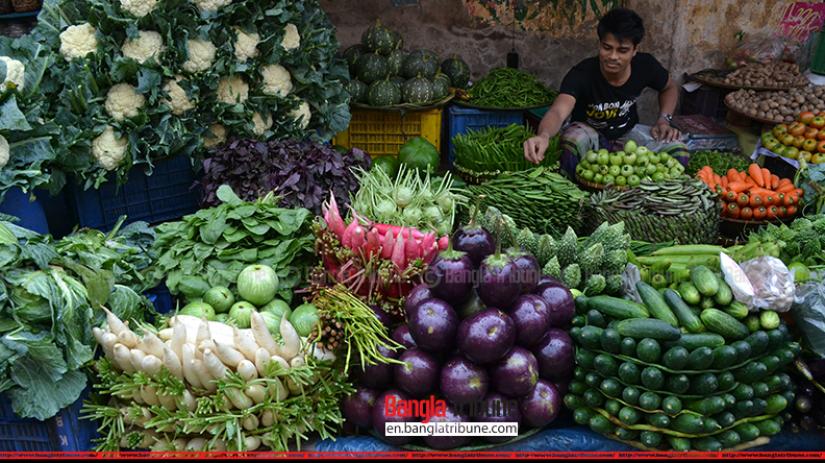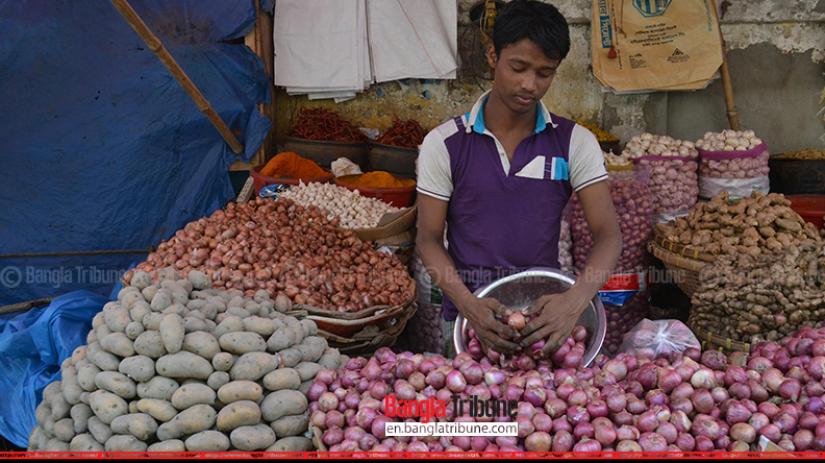 Amid the price hike of daily essentials ahead of Ramadan, the government has convened an urgent meeting with businessmen, when the commerce minister says “will inquire about the market updates”.
Amid the price hike of daily essentials ahead of Ramadan, the government has convened an urgent meeting with businessmen, when the commerce minister says “will inquire about the market updates”.
Letters have been sent to the traders in addition to the officials of ministries concerned and representative of different government organization and law enforcement agencies including Dhaka Metropolitan Police and National Board of Revenue to attend the meeting.
The meeting is scheduled for 3pm on Wednesday (Mar 27) at the Secretariat.
Speaking of the meeting, Commerce Minister Tipu Munsi told Bangla Tribune, “The traders will be asked about the supply and hoarding of the daily essentials … There’s no reason for prices to go up if there is no shortage of supply.”
With Ramadan due by the first week of May, the government has moved to beef up market monitoring to control the daily essentials’ price hike and ensure no ‘artificial crisis’ of products is created.
“The intelligence agencies work together every year to monitor the market,” Home Minister Asaduzzaman Khan Kamal told Bangla Tribune last week.
“These teams will inform the respective authorities if they find any problems and steps will be taken accordingly,” he said then.
According to sources at the ministries or commerce and home, as many as 14 teams have been engaged in monitoring the market across the capital since 2007.
Consumer rights bodies also called for tough market monitoring and punitive action against a group of traders who “take opportunity of extra demand during Ramadan and increase the commodities’ price.”
“A syndicate of opportunists is created if the market monitoring doesn’t work well,” said Humayun Kabir, who is the general secretary of Consumers Association of Bangladesh.
Meanwhile, on spot visits at city’s kitchen markets recently, price of the daily essentials was found on the rise.
At Hatirpool kitchen market, gourds and bitter gourd were being sold at Tk 90–Tk 110 last week; while tomatoes were being sold at Tk 40–50 per kg, local onions at Tk 35 per kg, and imported Indian onions at Tk 15–Tk 20 per kg.
Eggplant prices rose by almost Tk 40 since last month to Tk 60–Tk 70 per kg. Bottle gourd prices went from Tk 20–25 per piece to Tk 40–Tk 50, while papaya prices increased from Tk 10–Tk 15 to Tk 25–Tk 35 per kg.
Cucumber prices last month were at Tk 25 per kg, but now they are being sold at Tk 40–Tk 50 per kg. Pumpkin prices rose to Tk 50 per piece from Tk 35 per piece in February.
Additionally, the price of broiler chickens rose to Tk 170 per kg, up by Tk 30 since last week's price of Tk 140 per kg. Onion prices several days ago were at Tk 22 per kg, but now they are being sold at Tk 28 per kg.
Onion prices several days ago were at Tk 22 per kg, but now they are being sold at Tk 28 per kg.
Traders said supply of fish and winter vegetables are on the decline and summer vegetables are not in the market yet resulting in price hike.
“We had to hike the prices as the wholesale market has done it,” said Mizanur Rahman, a retailer from Jatrabari.
“Prices will go up if the supply doesn’t meet the demands,” said Kawranbazar kitchen market businessman Shafiqul Islam Lal Mia.
He said that so far such a problem has not yet come up but it has to be monitored that no one can stock up illegally.
Commerce Minister Tipu Munshi, however, said the prices of commodities “will remain within people’s budget throughout the year, not just Ramadan,”
All the government agencies will work together to ensure that there is no chaos in the market,” Munshi told Bangla Tribune on Mar 18.
With Ramadan ahead, the government has moved to reform the 14 existing committees to strengthen the market monitoring system, said the minster.
 Business
Business
41441 hour(s) 46 minute(s) ago ;
Noon 12:41 ; Wednesday ; Jul 09, 2025
Govt to sit with traders over rising commodity prices
Send
Shafiqul Islam
Published : 18:29, Mar 26, 2019 | Updated : 18:34, Mar 26, 2019
Published : 18:29, Mar 26, 2019 | Updated : 18:34, Mar 26, 2019
0 ...0 ...
/hb/
Topics: Top Stories
- KOICA donates medical supplies to BSMMU
- 5 more flights to take back British nationals to London
- Covid19: Rajarbagh, Mohammadpur worst affected
- Momen joins UN solidarity song over COVID-19 combat
- Covid-19: OIC to hold special meeting
- WFP begins food distribution in Cox’s Bazar
- WFP begins food distribution in Cox’s Bazar
- 290 return home to Australia
- Third charter flight for US citizens to return home
- Dhaka proposes to postpone D8 Summit
Unauthorized use of news, image, information, etc published by Bangla Tribune is punishable by copyright law. Appropriate legal steps will be taken by the management against any person or body that infringes those laws.
Bangla Tribune is one of the most revered online newspapers in Bangladesh, due to its reputation of neutral coverage and incisive analysis.
F R Tower, 8/C Panthapath, Shukrabad, Dhaka-1207 | Phone: 58151324; 58151326, Fax: 58151329 | Mob: 01730794527, 01730794528






